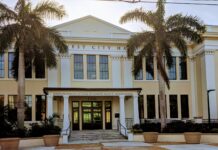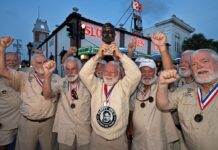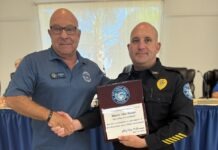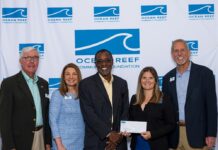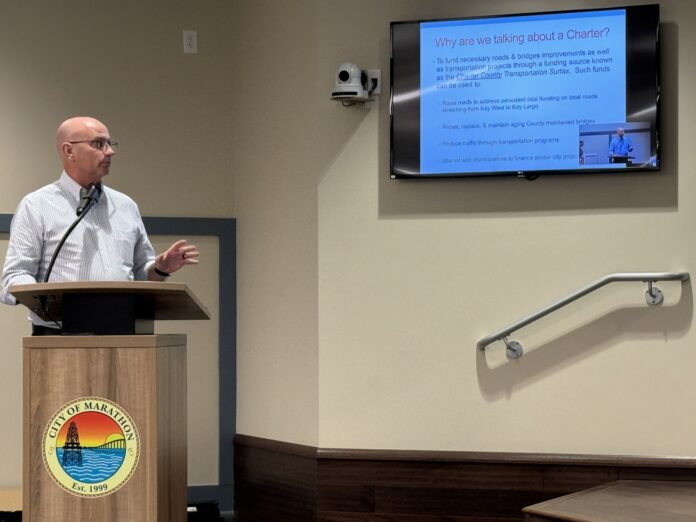
Development rights and zoning discussions dominated the second half of a lengthy Marathon City Council meeting on Jan. 9 – but not until the first half brought a conclusion to the city’s most oft-discussed bus stop debate and significant insight on a pivotal charter county referendum.
Sheriff Rick Ramsay spoke to open the meeting about ongoing issues with Marathon’s Kmart plaza bus stop, advocating for its removal. In recent months, the stop has become a miniature homeless encampment, something Ramsay said was fueled by a perfect combination of nearby conveniences and a larger shaded tiki hut structure – despite efforts by the city to discourage prolonged occupation with the installation of leaning posts in the sheltered area.
Likening the stop to a former stop in front of the nearby Brass Monkey bar and liquor store, which he said at one time produced 875 calls for service in a single year, Ramsay clarified that his stance was “not anti-homeless,” even supporting the city’s facilitation of the controversial 20th Street encampment as a preferred alternative to the bus stop.
“I don’t think there’s a solution to solve the problem as long as the structure exists,” he said. “What we see on a regular basis is people who are not using it because they can’t get into it. It’s difficult, but it’s the quality of life for everyone … and what we want taxpayers, citizens and visitors to see from Marathon.”
In contrast to prior meetings, Ramsay’s statements found widespread agreement from City Manager George Garrett and the council, who spoke of the stop’s disproportionate drain on city and law enforcement resources.
“The question is about who we are serving, and that’s the general public,” said Garrett. “We’ve tried everything, and it simply hasn’t worked.”
At the council’s direction, Garrett said the tiki structure will be removed.
Charter County Questions
With Monroe County considering pursuit of a charter county referendum vote, County Commissioner Michelle Lincoln and County Attorney Bob Shillinger spoke on the vote’s implications, zeroing in largely on the charter’s potential for preemption of local ordinances.
Shillinger reiterated that the primary goal would be to fund road and bridge improvements and maintenance along with a transportation system via an additional localized one-cent sales tax, which is currently impossible in the absence of a county charter.
While the county maintains 311 miles of roads, Shillinger said roughly half are projected to have impacts from sea level rise over the next 30 years, carrying an expected price tag of more than $1.6 billion. At a yearly sum of $56 million across the county, the revenue projection from the 30-year tax would approach $1.68 billion – a sum that would be theoretically shared with the Keys’ municipalities, as all would be subject to the tax.
Briefly outlining several distinctions in the charter that he said would give Keys voters more power over their county commission and voter initiatives, as well as establishing stronger home rule, Shillinger quickly dialed in on its potential to preempt local municipalities’ ordinances, saying the county commission’s priority is to leave the structure of existing government virtually intact while allowing for addition of the tax.
Language included in the draft charter and shown by Shillinger provides that municipal ordinances will prevail over county ordinances. But with a charter change possible in future years with a vote of a new-look county commission, he said recent additions would make that change as difficult as legally possible.
“People say, ‘Great, you put (the local ordinance language) in there. But what’s going to stop a future county commission from trying to change that?’” Shillinger said. “In recognition of that reality … (that) section may only be amended after a unanimous vote of the county commission to place the question on the ballot for referendum.”
Another option floated in early discussions would entirely remove such an amendment from the county commission’s power, requiring a voter initiative instead.
The charter county proposal and additional tax would each require majority approval in separate referendum votes. If the charter vote is successful in the November 2024 general election, the county would be required to submit the additional taxation program, including formulas for division among municipalities, to state auditors for review, analysis and an eventual report by early May 2026 in order to be included on that November’s ballot.
Councilman Jeff Smith questioned the unsolidified revenue split among municipalities, saying the $1.6 billion in revenue projections would not cover total costs once expenses for municipal roads were added.
“One of your sentences was ‘if’ we come to an agreement on sharing. ‘If’ really scares me, especially if I’m going to be asked to put a tax on my constituents,” he said. “It’s probably a much higher price tag countywide.”
“That’s why we’re not relying solely on this (tax) to address that problem,” said Shillinger. “(The $1.6 billion) doesn’t include bridges, that doesn’t include the transportation services. … (But) think about it. Roughly 50% of the voters in this county live within municipalities. So if we can’t come to an agreement, if we’re just going to take the money and not share it, it’s never going to pass.”
In addition to monthly discussion at county commission meetings, public hearings for the potential charter are set for March 20 in Key Largo, April 17 in Marathon and May 15 in Key West before a final hearing on July 17 in Marathon.
